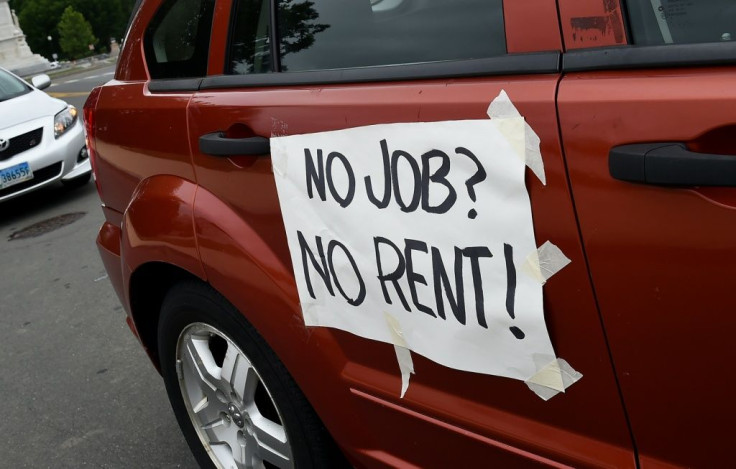Coronavirus Economy: Initial Unemployment Claims Lower As Stimulus Talks Stall

KEY POINTS
- There were nearly 1.2 million initial unemployment claims filed last week, a decrease from the previous week, breaking a two-week streak of increases
- It was the 20th week claims topped 1 million but the number was the lowest since late March
- In the comparable week of 2019, 179,879 claims were filed
Initial unemployment claims fell by nearly a quarter million last week to nearly 1.19 million, the first decrease in three weeks since the coronavirus pandemic took hold and the lowest level since late March, the Labor Department reported Thursday. The Bureau of Labor Statistics estimated the unemployment rate for the week ending July 25 at 11%.
The dip comes as talks on extending coronavirus relief stalled in Washington, with Democrats and the White House split on extending the $600 a week pandemic unemployment compensation. Democrats want the benefit extended through January while the White House wants a reduced benefit for a shorter duration.
Senate Majority Leader Mitch McConnell largely has been absent from the talks and admitted earlier there is no agreement within his caucus.
Initial claims last week were 249,000 lower than the revised estimate of 1.43 million for the week ending July 25.
“Even with continuing claims falling to more than 16 million, this is hardly the time to check off the ‘mission accomplished’ box on healing the pandemic ravaged economy,” Mark Hamrick, senior economic analyst at Bankrate.com, told International Business Times in an email.
“Although they [unemployment claims] have been persistently high going back to March, we must resist the temptation to take in stride these still quite elevated unemployment claims numbers. To do that would be to forget or be too dismissive of the fact that there is a heartbreaking human component to the economic fallout from the COVID-19 pandemic.”
It was the 20th week claims had topped 1 million.
“Today’s Labor Department report provides a stark warning of the impact of the sharp cut off in the $600 pandemic unemployment benefits and sends a foreboding sign,” Century Fund unemployment expert Andrew Stettner said in an email. “Most starkly, 1.6 million people who newly filed for federal and state unemployment benefits for the week ending July 25 are the first group of Americans impacted by COVID-19 who won’t receive the additional $600 per week provided by the CARES Act.”
The rate for the full month was scheduled for release Friday.
Stettner estimated the real unemployment rate at 20% but said Friday’s report is unlikely to reflect the true figure “because the unemployment rate is a deeply flawed measure of economic needs, and leaves out millions forced to leave work to care for children because of COVID-19, as well as people who are furloughed, underemployed or who can’t look for work due to pandemic restrictions.”
Unadjusted data indicated initial claims totaled 984,192 for the week ended Aug. 1, a dip of 18.5% from the previous week. Economists had expected a decrease of just 15,788 or 1.3%. In 2019, there were 179,879 claims for the comparable week.
The total number of people claiming benefits topped 32 million, up 1.3 million from the preceding week. That compares with 1.7 million in the comparable week of 2019.
Nearly 13 million people were collecting the $600 pandemic unemployment benefit, which expired last month, while 1.1 million claimed extended pandemic benefits.
The highest unemployment rates were recorded in Nevada, Puerto Rico, Hawaii, California and Louisiana. The largest increases in claims were recorded in Virginia, Nevada, Missouri, Indiana and New Jersey while the largest decreases were recorded in California, Georgia, Florida, Louisiana and Texas.
© Copyright IBTimes 2024. All rights reserved.












